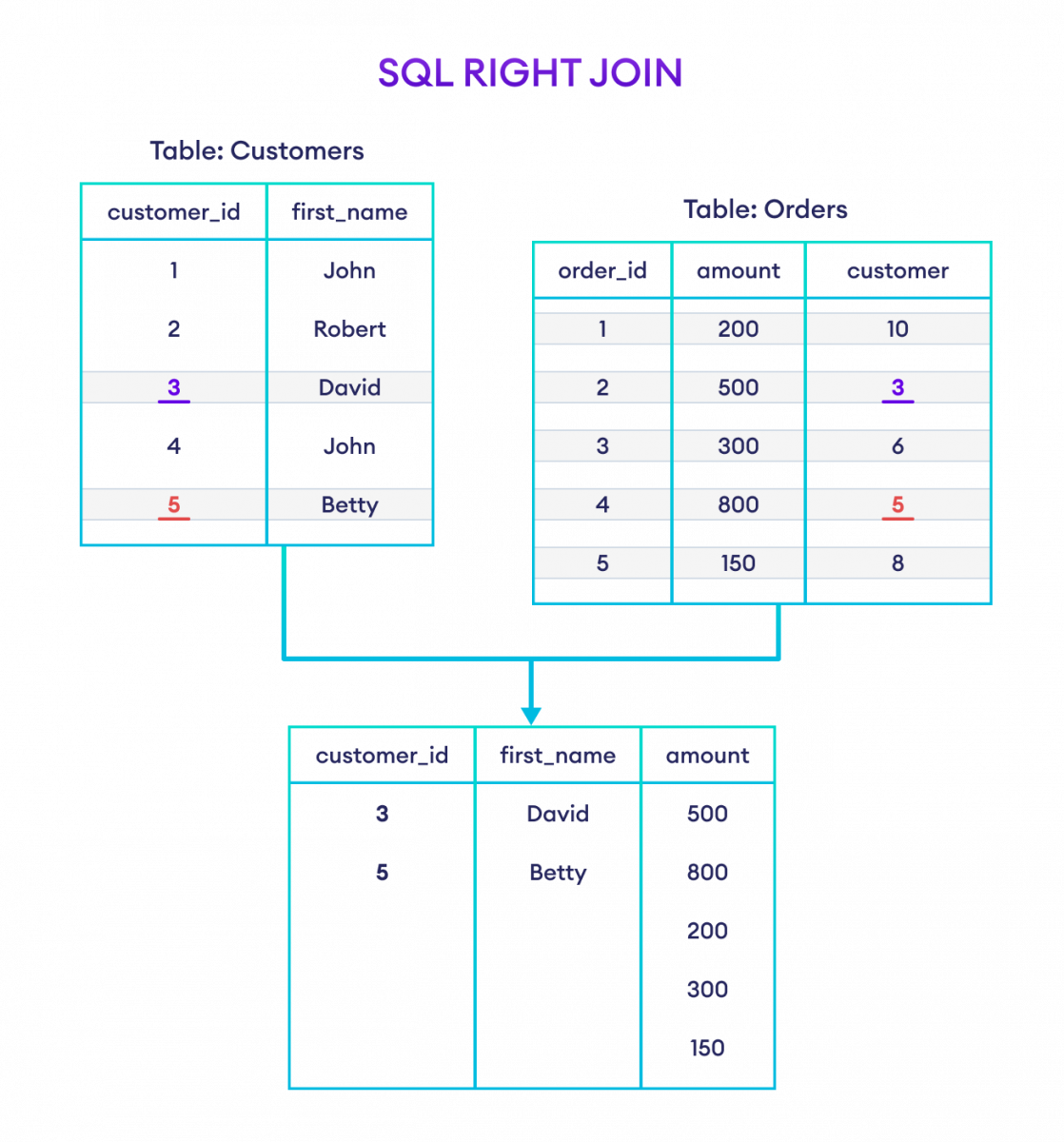The SQL RIGHT JOIN statement joins two tables based on a common column. It selects records that have matching values in these columns and the remaining rows from the right table.
Example
-- join Customers and Orders tables
-- based on their shared customer_id columns
-- Customers is the left table
-- Orders is the right table
SELECT Customers.customer_id, Customers.first_name, Orders.item
FROM Customers
RIGHT JOIN Orders
ON Customers.customer_id = Orders.customer_id;
Here, the code right joins the Customers and Orders tables based on customer_id, which is common to both tables. The result set contains
- customer_id and first_name columns from the Customers table
- item column from the
Orderstable (including those whose customer_id value is not present in theCustomerstable)
RIGHT JOIN SYNTAX
The syntax of the SQL RIGHT JOIN statement is:
SELECT columns_from_both_tables
FROM table1
RIGHT JOIN table2
ON table1.column1 = table2.column2
Here,
- table1 is the left table to be joined
- table2 is the right table to be joined
- column1 and
column2are the related columns in the two tables
Example: SQL RIGHT JOIN
-- join Customers and Orders tables
-- based on customer_id of Customers and customer of Orders
-- Customers is the left table
-- Orders is the right table
SELECT Customers.customer_id, Customers.first_name, Orders.amount
FROM Customers
RIGHT JOIN Orders
ON Customers.customer_id = Orders.customer;
Here's how this code works:

Here, the SQL command selects the customer_id and first_name columns (from the Customers table) and the amount column (from the Orders table).
And, the result set will contain those rows where there is a match between customer_id (of the Customers table) and customer (of the Orders table), along with all the remaining rows from the Orders table.
Note: RIGHT JOIN is not supported by our online SQL compiler since it's based on SQLite. However, you can get the same results by using a LEFT JOIN and swapping the left and right tables.
-- left join Orders and Customers tables
-- Orders is the left table
-- Customers is the right table
SELECT Customers.customer_id, Customers.first_name, Orders.amount
FROM Orders
LEFT JOIN Customers
ON Orders.customer = Customers.customer_id;
RIGHT JOIN With WHERE Clause
The SQL RIGHT JOIN statement can have an optional WHERE clause. For example,
SELECT Customers.customer_id, Customers.first_name, Orders.amount
FROM Customers
RIGHT JOIN Orders
ON Customers.customer_id = Orders.customer
WHERE Orders.amount >= 500;
Here, the SQL command joins the Customers and Orders tables and selects rows where the amount is greater than or equal to 500.
SQL RIGHT JOIN With AS Alias
We can use AS aliases inside RIGHT JOIN to make our SQL code short and clean. For example,
-- use alias C for Categories table
-- use alias P for Products table
SELECT C.category_name, P.product_title
FROM Categories AS C
RIGHT JOIN Products AS P
ON C.cat_id = P.cat_id;
Here, the SQL command performs a right join on the Categories and Products tables while assigning the aliases C and P to them, respectively.
Recommended Readings